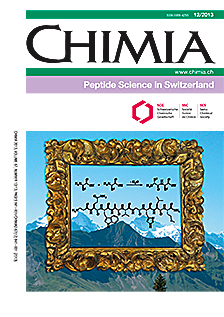Directed Evolution of Bicyclic Peptides for Therapeutic Application
DOI:
https://doi.org/10.2533/chimia.2013.910Keywords:
Cyclic peptides, Directed evolution, Peptides, Phage display, TherapeuticsAbstract
Many naturally occurring cyclic peptides or derivatives thereof are used as therapeutics such as the human hormones vasopressin and oxytocin or the antibiotics vancomycin and daptomycin. The success of cyclic peptide therapeutics is based on their ability to bind with high affinity, their good target selectivity and their low toxicity. As nature provides cyclic peptides to only a small number of disease targets, strategies have been developed to generate cyclic peptide ligands with tailored specificity de novo. Our laboratory is specialized on the directed evolution of bicyclic peptide ligands by phage display. In this article, we review our recent work to in vitro evolve bicyclic peptide antagonists, the binding and pharmacokinetic properties of bicyclic peptides, as well as efforts to generate bicyclic peptides for therapeutic application.Downloads
Published
2013-12-18
How to Cite
[1]
P. Diderich, C. Heinis, Chimia 2013, 67, 910, DOI: 10.2533/chimia.2013.910.
Issue
Section
Scientific Articles
License
Copyright (c) 2013 Swiss Chemical Society

This work is licensed under a Creative Commons Attribution-NonCommercial 4.0 International License.







